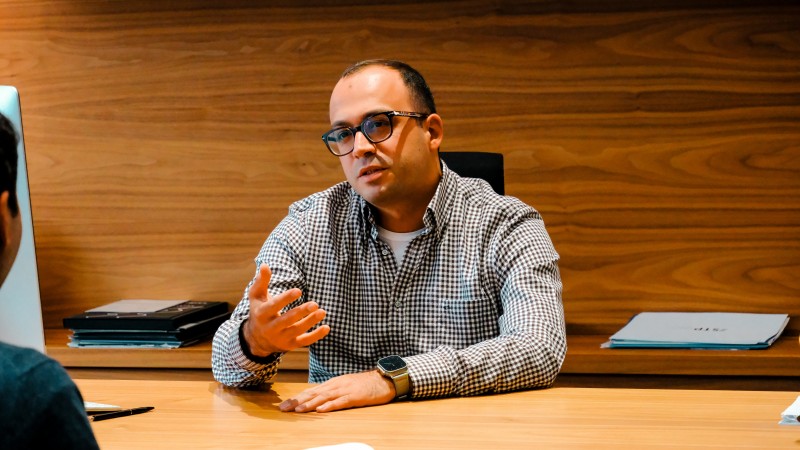I prefer to read business-oriented books and draw parallels: Edgar Avetisyan, CEO of

Interview with the CEO of
Mr. Avetisyan, what is the role of books in your life, and how do they contribute to your success as a businessman and leader?
Overall, I highly value reading as it cultivates one's mind, broadens perspectives, and enriches one's worldview. While I find value in various genres, like detective, non-fiction, or autobiography, I particularly prefer business-oriented literature. Emotionality is not so much my thing, I rarely approach fiction books. I prefer to browse, learn, remember, and apply business-oriented books. The books in my library reflect my world, and as I read, I constantly draw parallels between our business, our company's management policies, and international practices. While there are often differences, I've found numerous similarities as well. Sometimes, I pause at the end of a paragraph or a phrase to analyze its relevance and effectiveness in our company's operations.
You studied abroad, which book from those years had a great impact on you and do you associate it with those years?
During my studies as an economist at the Halt International Business School in San Francisco, followed by a four-month management course at Stanford University, books became my constant companions. From the outset of my education abroad, I delved into professional literature recommended by our esteemed professors. These mentors imparted invaluable insights into business management and economic development, often assigning readings to supplement our learning.
I vividly recall one such task assigned by our professor early on. After a class, we were tasked with reading "The Five Dysfunctions of a Team" within a mere two days, followed by an exam on its topics. Initially, the urgency and brevity of the assignment seemed surprising. However, it soon became evident why such a challenge was presented. The content of the book proved immensely captivating, and the tight timeframe served as a test of our ability to swiftly absorb and apply key concepts. In addition, we soon began to do very intensive teamwork. That book was a wonderful example of teamwork, harmonious working style and business thinking.
To this day, "The Five Dysfunctions of a Team" remains a staple in my library, serving as a valuable resource in managing our company and strengthening our business capabilities so that "PROFAL" becomes one complete team, the foundations of which are quite strong. The book masterfully depicts the crisis of a large company and the imperative need for swift recovery to avert catastrophic failure. One of the company's owners convinces the others to hire a female manager, whose first step is to organize out-of-office training for top management and to form direct contacts in an informal environment. The unexpected strategy of the female leader quickly restores the company's gaps and contributes to its progress. She evaluates the abilities of each employee and makes the right conclusions during the short meeting.
Which book would you recommend young people to read?
First of all, the book "Why Nations Fail" by our compatriot Daron Acemoglu. We have to read. Thanks to that book, the new generation can understand why nations fail or succeed. The perception of the world changes significantly after this book. The presented parallels between North and South America, and North and South Korea fully demonstrate the causes and consequences of the failure.
In the realm of business, decision-making and crisis management are perpetual demands. Can literature offer assistance during such critical junctures?
I have experience in crisis management for a long time. That's how it turned out. When I joined the "PROFAL" team, I can say that it was not the best time for the company. Problems were arising and deepening. We did a great job as a team on the way to bringing the company back from the recession and then ensuring stable development. The first attempt was solved without the help of books, thanks to the correct assessment of the situation, calculating the risks, and taking drastic steps. To get out of the next difficult situations, of course, education, knowledge, and books - the professional base - helped.
A good book is like a good wine that you always want to enjoy. Is there a book that you read all the time?
I refrain from revisiting books I've already read. Unlike some of my friends who find value in rereading, I prefer to extract the best ideas, tips, and rules from each book and transcribe them into my notebook. Within its pages, you'll find snippets from various texts that I frequently peruse. My last post is from Elon Musk's book, where he is asked how important education is to success, and Musk answers: "No, in order to succeed in business, it is not necessary to graduate from a famous school, you can educate yourself and get back to the top of the pyramid. The sources are open, available, and the desire is enough to get useful and important knowledge. Then he goes on to say that the top managers of big companies tend to attract students from the best schools, because those people do the same thing for years, consistently and tirelessly, developing willpower. And in that process, it is very important not to be disappointed, not to be afraid of difficulties, and to overcome them, which will later bring results in business.
Volitional qualities are important, but higher education is very important, which I can confirm from my experience, has given its desired result. In the educational process, assignments and deadlines are constantly set, which you cannot violate. This is where the ability to properly manage your time becomes extremely important. Set reasonable deadlines and implement them days in advance. It seems that this is a well-known saying but we all face this problem all the time. Equally important is flexibility in negotiating, in allowing the team to work, to achieve more. Motivation is an indispensable factor in business.


Have you found your character in any book or in the plot of which book would you like to appear?
I've frequently envisioned myself as a member of the business team depicted in "The Five Dysfunctions of a Team," particularly in the scene where the newly appointed female manager assesses the capabilities and contributions of each team member. I've often pondered how she would evaluate my performance and whether I would remain part of her team, perhaps even in a more senior role.
Which literary hero or author would you like to have lunch with?
Richard Kosh. I would definitely like to talk with him about business issues. He is a world-renowned business consultant, worked in mega-corporations, and then created his own successful company. All his life, Kosh studied the lives of prestigious businessmen and defined the success formulas. Richard presents those stories in his books; we can consider them unique textbooks. I am sure that a conversation with him would be useful and pleasant.
Do you manage to read books to your children and what was the last one?
Unfortunately, due to work and workload, I hardly get to spend a long time with my children. I try to be with them on weekends, including reading books. The last one I read was the adventure book "Invisible Tonino" by Gianni Rodari. The choice was not accidental, the hero's adventures were staged at school, and we decided to read and discuss the book.
How important do you consider reading books among employees and constantly developing in the professional field?
We care, more precisely, it is a priority. I consider that one of the ways to increase the effectiveness of the team is to be close to professional literature. Our employees always want to develop. This is in the interest of the common cause. We work with dozens of European, American, and Asian countries, and we receive various orders, which they may not always be fully familiar with. In that matter, the book, the experience, and the research ability are irreplaceable. The main prerequisite for development is the expansion of one's horizons, of course, first of all, thanks to books.
Blitz questions
Print or e-book?
Print, for sure. I like to browse and touch the book. Gadgets do not convey the full charm of the book.
Hercule Poirot or Sherlock Holmes?
Poirot. Being Agatha Christie's literary hero, he always paid attention to human psychology, behavior, and interpersonal relationships in his investigative activities. I fully share his views and try to focus on human characteristics when getting to know people.
Harry Potter or Lord of the Rings?
Lord of the Rings. First of all, for the author. John Ronald Reuel Tolkien created languages to write the book. This is hard work and deserves appreciation.
Elon Musk or Jeff Bezos?
Both of them, in their own unique manner, have left an indelible mark. Individuals like Musk emerge perhaps once in a century, revolutionizing thought and technology—from mitigating the environmental impact on our planet to exploring the vast expanse of the universe. Yet, Bezos too stands out as an extraordinary figure. The entrepreneurial mindset of Amazon's founder resonates deeply with me, and I draw parallels between our companies, incorporating them into our strategies.
Beloved writer
Today it will be difficult for me to say who I prefer, because there are authors whom I read, but not all of them are the best for me. If we go further back, in my youth I often read the works of Vakhtang Ananyan.
Favorite book.
Daron Acemoglu "Why Nations Fail"
A book that every Armenian should read.
"The burning Tigris". It is the book of our compatriot Peter Balakian about the Armenian Genocide. The period from the 1890s to the 1920s is described. He tells in detail and carefully about the life and activities of Armenians and presents the entire tragedy of the Great Genocide visibly, with arguments and examples. Sometimes people think that the Armenian Genocide began and ended on April 24, 1915, while it was a deliberate, clear-cut sequence of ethnic massacres. Balakian describes the whole picture of the Genocide, which actually lasted for about three decades.
Read also

Winterfest to feature David Georgyan’s sci-fi action novel Impedance (trailer)

At Winterfest 2026, Newmag will present Marianna Hakobyan’s “Don’t Change the Names” (trailer)

Closing and Award Ceremony of the “Sprout in Armenian – 2025” Competition at Newmag Winterfest

“I hope my story will inspire many and help them keep believing and dreaming.” Henrikh Mkhitaryan’s welcoming speech to Armenian fans (video)

